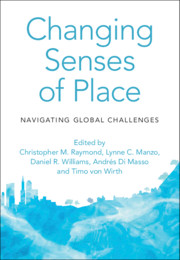Book contents
- Changing Senses of Place
- Changing Senses of Place
- Copyright page
- Dedication
- Contents
- Contributors
- Foreword
- Preface
- Acknowledgements
- Introduction
- Part I Climate Change and Ecological Regime Shifts
- Part II Migration, Mobility and Belonging
- Part III Renewable Energy Transitions
- Part IV Nationalism and Competing Territorial Claims
- Part V Urban Change
- Part VI Technological and Legal Transformations
- Part VII Design and Planning Strategies for Changing Senses of Place
- 22 Local Sense(s) of Place in a Global World
- 23 Urban Experimentation and the Role of Senses of Place
- 24 Domestic Matters
- Part VIII Conclusion
- Index
- References
24 - Domestic Matters
IKEA Catalogues, the Good Home and the Changing Aspirations of Urban Chinese
from Part VII - Design and Planning Strategies for Changing Senses of Place
Published online by Cambridge University Press: 15 July 2021
- Changing Senses of Place
- Changing Senses of Place
- Copyright page
- Dedication
- Contents
- Contributors
- Foreword
- Preface
- Acknowledgements
- Introduction
- Part I Climate Change and Ecological Regime Shifts
- Part II Migration, Mobility and Belonging
- Part III Renewable Energy Transitions
- Part IV Nationalism and Competing Territorial Claims
- Part V Urban Change
- Part VI Technological and Legal Transformations
- Part VII Design and Planning Strategies for Changing Senses of Place
- 22 Local Sense(s) of Place in a Global World
- 23 Urban Experimentation and the Role of Senses of Place
- 24 Domestic Matters
- Part VIII Conclusion
- Index
- References
Summary
Taking IKEA catalogues from 2010 to 2017 as the objects of analysis, this chapter examines how this global furniture retailer constructs the ideal homes that offer Chinese consumers aspirations for good homes and good lives, and their cultural implications. We argue that IKEA’s popularity in China is attributed to a ‘cultural odourlessness’, which, for its ease in travelling globally, has also become an odour in itself in the Chinese context. In its global circulation, IKEA’s transcultural odourlessness attracts – rather than rejects – diverse translocal experiences of different places and therefore powerfully enriches and pluralises senses of place. IKEA exemplifies how transcultural flows de-territorialise and re-territorialise home, endlessly pluralising senses of home.
- Type
- Chapter
- Information
- Changing Senses of PlaceNavigating Global Challenges, pp. 313 - 328Publisher: Cambridge University PressPrint publication year: 2021

